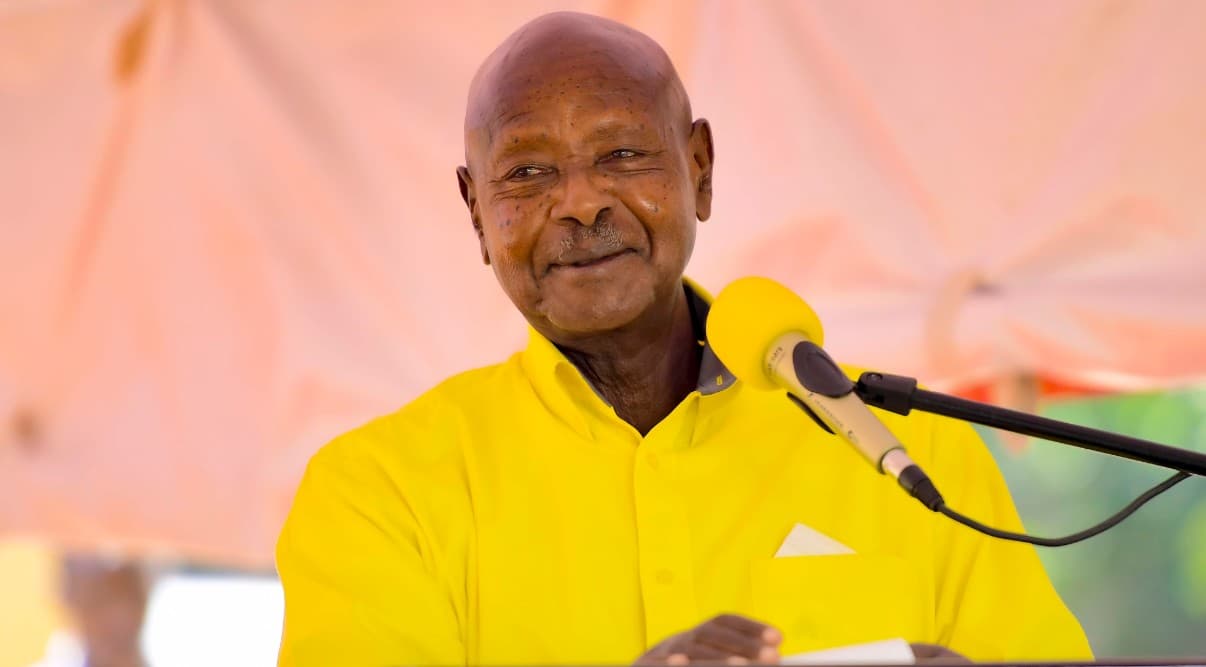We're loading the full news article for you. This includes the article content, images, author information, and related articles.
Ugandan President Yoweri Museveni has intensified his re-election campaigns in the West Nile region, dispelling recent online rumours about his health as Uganda prepares for general elections in January 2026.

Ugandan President Yoweri Museveni, 81, has escalated his campaign efforts across Uganda's West Nile sub-region, just days after widespread online speculation regarding his health. On Monday, October 20, 2025, President Museveni addressed a rally at Paridi Stadium in Adjumani, concluding a week-long mobilisation tour in the region. His public appearance aimed to counter misinformation that suggested he had been taken ill and hospitalised.
During his address, President Museveni thanked the people of Adjumani for their warm reception and reiterated his commitment to the National Resistance Movement (NRM) agenda. He specifically acknowledged the support from various districts in West Nile, including Pakwach, Nebbi, Zombo, Obongi, Madi-Okollo, Arua, Koboko, Yumbe, Moyo, Terego, Maracha, and Adjumani, urging continued backing for the NRM to achieve further development.
President Museveni, who assumed power in 1986, is seeking another term in office in the upcoming general election scheduled for January 12, 2026. His long tenure has seen the abolition of presidential term limits in 2005 and age limits in 2017, allowing him to contest for re-election multiple times. The NRM, under Museveni's leadership, has consistently emphasised peace, unity, and stability as core tenets of its ideology, transforming regions like West Nile from volatile areas into zones of growth.
The current campaign period officially commenced in early October 2025, following the Electoral Commission's clearance of presidential candidates. Museveni was formally declared the NRM candidate in July 2025 and recognised by the election commission on September 23, 2025.
Uganda's presidential elections are conducted using a two-round system, requiring candidates to secure at least 50% of the vote in the first round. Presidential candidates must be Ugandan citizens by birth and meet the qualifications to be a Member of Parliament. The Electoral Commission of Uganda is responsible for supervising the elections.
Key government initiatives highlighted during Museveni's campaigns include the Parish Development Model (PDM), which aims to combat household poverty by providing Shs 100 million per parish annually for income-generating projects. The NRM also pledges to invest in infrastructure, such as roads and electricity, and improve social services like health and education.
Local leaders and residents in the West Nile sub-region have presented various demands to President Museveni, including economic empowerment and a resolution to the long-standing Apaa land conflict, which has affected over 30,000 rural dwellers. The Apaa dispute, involving a 1,000 km² fertile land area, has been a source of tension between the Acholi and Madi communities for nearly two decades.
During his rallies, Museveni has welcomed new converts from opposition parties to the NRM, and NRM officials have expressed confidence in securing significant electoral support in the West Nile region.
The circulation of misinformation regarding President Museveni's health underscores the challenges of information integrity in the lead-up to the elections. Previous instances of similar rumours in 2023 and 2024 were debunked, highlighting a pattern of health-related disinformation targeting the President.
Museveni's absence from the state burial of former Kenyan Prime Minister Raila Odinga on Sunday, October 19, 2025, further fueled these speculations. However, a delegation led by former Prime Minister Ruhakana Rugunda and Minister of State for Foreign Affairs John Mulimba represented Uganda, conveying Museveni's condolences and describing Odinga as a distinguished statesman.
While President Museveni's public appearance has seemingly addressed the recent health rumours, the persistent nature of such speculation in Ugandan politics remains a point of concern. The impact of these rumours on public perception and the broader electoral landscape is yet to be fully assessed.
Observers will be closely watching the intensity of the NRM's campaign efforts and the responses from opposition parties as the January 2026 election draws nearer. The government's handling of regional issues, such as the Apaa land conflict, and its ability to address concerns about corruption and unemployment will be critical factors. The role of social media in disseminating information and misinformation will also remain a key area of focus.
Keep the conversation in one place—threads here stay linked to the story and in the forums.
Sign in to start a discussion
Start a conversation about this story and keep it linked here.
Other hot threads
E-sports and Gaming Community in Kenya
Active 9 months ago
The Role of Technology in Modern Agriculture (AgriTech)
Active 9 months ago
Popular Recreational Activities Across Counties
Active 9 months ago
Investing in Youth Sports Development Programs
Active 9 months ago
Key figures and persons of interest featured in this article